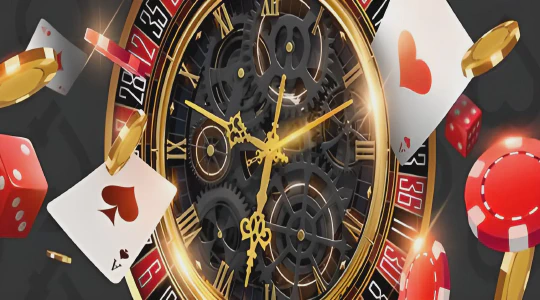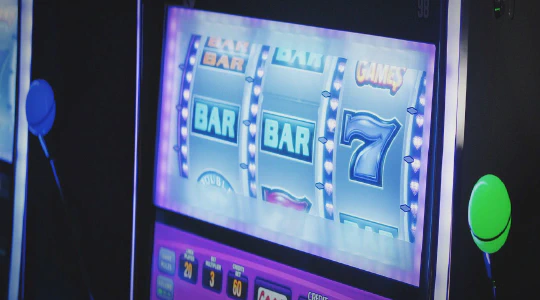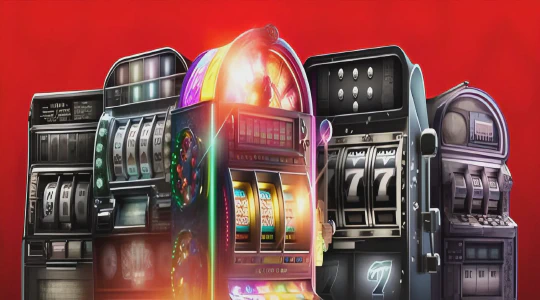Discover the Meaning Behind Bet Slang Words
Have you ever found yourself confused by the slang words and phrases used by young people these days? If so, you are not alone. With the rise of social media and the internet, new slang words and phrases seem to be popping up every day, making it difficult to keep up with the latest trends.
One area in which slang has become particularly prevalent is in the world of betting. From sports betting to online casinos, betting has become a popular pastime for many. However, if you are not familiar with the latest betting slang, you may find yourself at a disadvantage.
That's where this comprehensive guide to betting slang comes in. We have compiled a list of the most commonly used slang words and phrases in the world of betting, along with their definitions, to help you stay ahead of the game. Whether you are a seasoned betting enthusiast or a newcomer to the scene, this guide is sure to be a valuable resource.
The Importance of Familiarizing with Bet Slang
Betting has been a popular activity for people who are looking to make some extra cash through their sports knowledge. Whether it is placing a bet online or meeting up with friends to make predictions, betting has a language of its own that must be understood. Knowledge of Bet slang is a crucial aspect of betting.
Knowing Bet slang can help you converse with other bettors effortlessly. It can also give you an advantage when placing bets, as you can decipher betting options faster. Understanding the meaning of Over/Under, Teasers, or Parlays can make a world of difference when placing bets Mostbet.
Bet slang also helps you interpret betting odds and find value in your bets. Odds such as Plus/Minus, American or Decimal odds might seem daunting at first. With knowledge of Bet slang, it is easier to understand how odds work and make informed decisions when placing a bet on a particular outcome.
Lastly, Bet slang can help you stay informed about any changes in the sports betting world. Understanding concepts such as Hedging or Steam Chasing can give you an insight into how professional bettors operate and might inform your own betting strategies.
In summary, familiarizing yourself with Bet slang is an essential step towards becoming a successful bettor. It helps you converse with ease, interpret betting odds, and stay ahead of the game. Once you grasp the terms and their meaning, it only gets more exciting to place bets and win.
Understanding Bet Slang Terminology
Bet slang is widely-used in sports betting, and not understanding the terminology can lead to confusion and frustration. To make profitable bets, it is essential to familiarize yourself with the terms and phrases used in the betting world.
Moneyline
The moneyline refers to the odds of a particular team winning a game. A minus sign (-) indicates the favorite, while a plus sign (+) indicates the underdog. For example, if the moneyline is -150, you need to bet $150 to win $100. In contrast, if the moneyline is +150, betting $100 can win you $150.
Point Spread
A point spread is a handicap given to the favored team to level the playing field. If the point spread is -3.5, the favored team needs to win by at least four points for the bet to pay out. Conversely, if the point spread is +3.5, the underdog must either win the game outright or lose by no more than three points.
Over/Under
Also known as the total, the over/under is the predicted number of points that will be scored in a game. Bettors can bet on the final score either going over or under the set total.
Futures
Futures refer to bets placed well in advance of a sporting event. For example, you may place a bet on a team to win the Super Bowl before the season starts. Futures often offer higher payouts, but they come with more significant risks.
Parlay
A parlay is a bet that combines multiple wagers into one. In a parlay, all bets must win for the bet to pay out. Even one loss means the entire parlay bet is a loss.
By understanding these and other commonly-used terms in the world of sports betting slang, you can make more informed decisions and place smarter bets.
Common Bet Slang Words and Phrases
1. Action
When a bettor places a wager on any sporting event or game, it's called "Action".
2. Bankroll
Bankroll is usually defined as the total amount of money that a bettor must have to place bets. It's basically the sum of money that a bettor has set aside specifically for betting purposes.
3. Juice
Juice refers to the commission that a sportsbook charges a bettor on every bet they place. It's also called "Vig" or "Vigorish".
4. Lock
A lock implies that a particular outcome is a sure winner. A lot of times, bettors use this term to describe a bet that's guaranteed to win.
5. Underdog
An underdog refers to a team or athlete that's expected to lose a particular game or match. They are the less favored team and are usually assigned positive odds in betting.
6. Handicapping
Handicapping is the process of analyzing and predicting the outcome of a sporting event or game. It's a crucial aspect of the betting process and can help bettors make informed decisions.
7. Live Betting
Live or in-game betting is a type of betting where bettors can place wagers on an event while it's already in progress. This kind of betting is becoming increasingly popular and is now offered by most sportsbooks.
Sports Betting Slang
Sports betting has its own set of slang and jargon that might seem unfamiliar to beginners. Understanding the lingo of the sports betting world is essential to improve your chances of winning big and to navigate the industry effectively.
Key Terminology
- Action: Refers to the total amount of money that has been bet on a game.
- Chalk: The team or player who is favored to win the game.
- Underdog: The team or player who is expected to lose the game.
- Cover: This means to win against the point spread. If a team covers the point spread, it means that they have won by more than the expected margin of victory.
- Push: This happens when the final score of a game lands exactly on the point spread. In this case, no one wins the bet and all the money is returned to the bettors.
Currency
In sports betting, it's important to keep an eye on the odds and lines, and you'll often see them expressed in different formats, depending on where you're betting. Some common formats include:
- American: This format displays odds as a plus or minus number. For example, if the odds are +150, it means that you would win $150 if you bet $100. If the odds are -150, it means that you would need to bet $150 to win $100.
- Decimal: This format displays odds as a simple number. For example, if the odds are 1.50, it means that you would win $1.50 for every $1 that you bet.
- Fractional: This format displays odds as a fraction. For example, if the odds are 6/4, it means that you would win $6 for every $4 that you bet.
Understanding the odds and currency is essential to making informed betting decisions and maximizing your winnings. By learning the slang and terminology of sports betting, you can better understand the industry and make more informed decisions.
Horse Racing Slang
Get Up —
This term is used to describe a horse that comes from behind and outpaces the front runners to win the race.
Mudder —
A horse that performs well on a wet surface, known as a muddy track, is called a Mudder.
Wire to Wire —
A horse that leads the race from start to finish is called a Wire to Wire winner.
Photo Finish —
When the winner of the race is decided by a photo taken at the finish line, it is called a Photo Finish – very close call.
Exacta —
A bet placed on the first and second place horses in exact order is called an Exacta.
Trifecta —
A bet placed on the first, second and third place horses in exact order is called a Trifecta.
Across the Board —
A bet placed on a horse for win, place, and show is called an Across the Board bet.
Furlong —
A furlong is a measure of distance in horse racing, which is equivalent to 1/8th of a mile, or 220 yards.
Closer —
A horse that typically finishes strong in the last quarter of the race is called a Closer.
Jockey —
The person who rides the horse during a race is called a Jockey, and he or she plays an important role in the horse's success.
Casino Betting Slang
The Language of Casino Betting
Casino betting slang can be difficult to navigate for those new to the world of gambling. It’s important to understand the language if you want to maximize your chances of winning big. Here are some common terms you’ll hear in a casino:
Ace in the Hole
When a player has an ace in the hole, it means they have an excellent hand that is hidden from view. This term is commonly used in poker and blackjack.
Cold Deck
A cold deck is a deck of cards that is stacked in favor of the casino. This could mean that certain cards are marked or that the deck is shuffled in a specific way to favor the house.
High Roller
A high roller is a player who bets large amounts of money at a casino. They are typically given VIP treatment and perks such as free drinks and meals.
Chase
To chase is to bet more money in an attempt to recoup losses. This can be a dangerous strategy that often leads to even greater losses.
Inside Bet
An inside bet is a bet made on the numbers located inside the roulette table. These bets have higher odds of winning but also have a higher payout.
Outside Bet
An outside bet is a bet made on the numbers located outside the roulette table. These bets have lower odds of winning but also have a lower payout.
Table Stakes
Table stakes refer to the amount of money a player has on the table during a game. Players are not allowed to add more money to their stake during the game.
| Slang Term | Definition |
|---|---|
| Big Blind | The initial bet in Texas Hold’em Poker, posted by the player to the left of the dealer |
| Bust | To exceed the number 21 in blackjack, resulting in an automatic loss |
| Double Down | To double your bet in blackjack after seeing the first two cards |
| Junket | A trip organized by the casino for high rollers, including travel, accommodations, and other amenities |
| The Pit | The casino area where table games are located |
Understanding these terms will give you an advantage when playing casino games. Remember to always gamble responsibly and within your means.
Poker Slang
If you're new to poker, you may find yourself lost in a sea of unfamiliar jargon. Understanding the slang used by experienced players is essential to being able to hold your own at the table. In this guide, we'll explore some common poker slang.
- All-in: Putting all of your chips into the pot.
- Bad beat: Losing a hand you were favored to win.
- Bluff: Pretending to have a stronger hand than you actually do.
- Flop: The first three community cards that are dealt face up in Texas Hold'em.
- Nuts: The best possible hand at any given point in the game.
- Pot: The total amount of money that players have placed in the middle of the table.
- River: The fifth and final community card that is dealt face up in Texas Hold'em.
- Showdown: The final stage of the hand where remaining players reveal their cards.
Learning these basic terms will give you a solid foundation for understanding more advanced poker slang as you continue to play. Remember, a strong knowledge of poker slang can go a long way in helping you bluff your opponents, understand their play, and improve your own game.
Gambling Slang Around the World
Gambling has been an age-old pastime for many cultures around the world, and with that comes a rich vocabulary of slang terms used to describe the different aspects of the game. These terms are often specific to different countries and regions, so it's important to have a global perspective when learning about gambling slang.
North and South America
In North America, some common gambling slang terms include "action" (referring to the amount of money wagered), "juice" (referring to the commission taken by a bookmaker), and "hit me" (requesting an additional card in a game of blackjack). In South America, one might hear the term "chance" in Brazil, or "maraquetear" in Argentina, meaning to shuffle the cards.
Europe
Europe is home to a plethora of gambling slang terms as well. In the UK, "bookies" refers to a bookmaker or betting shop, while "punter" refers to the better. In France, one might hear the term "croupier" (dealer), or "cagnotte" (the pot of money in a game of poker). Germany uses the term "tipp" for a bet and "glücksspiel" for gambling in general.
Asia
Asia is home to some unique gambling slang terms, influenced by the region's cultural traditions. In China, "pai gow" means to split cards, while "dominoes" refers to a type of game where players bet on how many dots will appear on the cards. In Japan, "saisai" is a term for rolling a three on a dice, which is considered a lucky number in Japanese culture.
It's important to familiarize yourself with these terms if you're planning on gambling in a different country or culture. However, always remember to gamble responsibly and within your means, no matter where you are in the world.
How Bet Slang Changes Over Time
Bet slang is an important part of the world of sports betting. As with any language, bet slang is constantly evolving and changing over time. This is due to a number of factors, including the introduction of new sports, changes in technology, and shifts in cultural attitudes.
One of the major drivers of change in bet slang is the introduction of new sports. As new sports become popular, bettors begin to develop new terminology to describe the specific nuances of those sports. For example, when mixed martial arts (MMA) first became popular in the early 2000s, bettors began using terms like "ground and pound" and "rear naked choke" to describe the unique betting opportunities available in this new sport.
Changes in technology also play a role in the evolution of bet slang. As betting moves online and becomes more digital, bettors are able to communicate and share information more easily than ever before. This has led to the emergence of new slang and terminology that is specific to online and mobile betting platforms. For example, the term "juice" has taken on a new meaning in the digital age, referring to the commission that online sportsbooks take on each bet.
Cultural attitudes also impact the way that bet slang evolves over time. As society becomes more accepting of certain types of bets or forms of gambling, new terms emerge to describe these phenomena. For example, as daily fantasy sports (DFS) has become more popular in recent years, bettors have developed new terms like "stacking" (choosing multiple players from the same team) and "contrarian" (picking players that are not popular choices among other bettors).
In summary, bet slang is a constantly changing language that reflects the evolving world of sports betting. From the introduction of new sports to the growth of online and mobile betting platforms to shifts in cultural attitudes, there are a variety of factors that influence the way that bettors talk about their favorite pastime.
The Evolution of Bet Slang
Like any other language, bet slang has evolved over time. Words and phrases that were popular in the past have since fallen out of use, while new ones have emerged to reflect changes in the betting landscape.
One example of slang that has stood the test of time is "bookie," which comes from the term "bookmaker." This term was first used in the 18th century to refer to individuals who set odds and accepted bets on horse races. Today, the term "bookie" still refers to individuals or companies that take bets from customers.
Another example of bet slang that has evolved is the use of the term "juice" to refer to the commission that a bookie takes on a bet. At one time, the commission was referred to as the "vigorish" or "vig" for short. However, over time, the term "juice" has become more common, especially in the United States.
As sports betting has become more mainstream, new slang terms have emerged to reflect the changing landscape. For example, the term "fade" is now commonly used to describe a betting strategy in which a bettor picks against a team or player that is heavily favored to win.
Overall, the evolution of bet slang reflects the changing nature of the betting industry and the cultural context in which it operates. As sports betting continues to grow in popularity, it's likely that new slang terms will emerge to reflect new betting strategies and trends.
Using Bet Slang Correctly
Using bet slang can be a fun way to add some excitement to your conversations, but it's important to use it correctly to avoid misunderstandings. Here are some tips to help you use bet slang like a pro:
- Do your research: Before using any bet slang terms, make sure you understand their meaning and context. You don't want to accidentally use a term incorrectly and offend someone or give them the wrong impression.
- Know your audience: Not everyone will be familiar with bet slang, and some people may not appreciate it. Before using it in a conversation, consider who you're talking to and whether they'll be receptive to it.
- Use it sparingly: Bet slang can be fun, but using it too often can make you seem unprofessional or immature. Use it sparingly and appropriately to make the most impact.
- Be confident: When using bet slang, be confident in your delivery and tone. This will help you come across as someone who knows what they're talking about and is comfortable using this type of language.
- Be respectful: Just because you're using bet slang doesn't mean you can forget about basic manners and respect. Always be respectful in your conversations, even when using slang terminology.
By following these tips, you can use bet slang in a fun and effective way while avoiding any potential misunderstandings. So, go ahead and add some excitement to your conversations with some well-placed bet slang terms!
Avoiding Offending Others with Bet Slang
Bet slang can be a fun and engaging way to communicate with your friends, but it's important to remember that not everyone may understand or appreciate it. Using bet slang in the wrong context or with the wrong audience can come across as disrespectful or offensive.
When using bet slang, it's important to be mindful of who you're communicating with. If you're unsure if the other person is familiar with the slang you're using, it's best to avoid it or explain the meaning behind it.
In addition, it's important to avoid using bet slang that is derogatory or discriminatory towards certain groups of people. This can include slang that is offensive to women, people of different races or ethnicities, or members of the LGBTQ+ community.
To ensure that you're not offending anyone with your use of bet slang, it's a good idea to keep a list of slang terms that you know are acceptable and avoid using any new or unfamiliar slang in sensitive situations.
- Be mindful of your audience
- Avoid derogatory or discriminatory slang
- Explain the meaning behind slang if unsure
- Maintain a list of acceptable slang terms
Learning and Practicing Bet Slang
Learning bet slang is no different from learning any other language. You need to immerse yourself in it, understand the jargon and the context in which it's used. Take your time and study the different bet slang terms, so you can recognize them when they come up in conversation.
Practice is also important when learning bet slang. Find people who are familiar with the jargon and practice using the terms yourself. You could also join online forums where bettors discuss games and strategies. Make sure to keep up with the latest trends and avoid outdated slang!
To practice effectively, it's important to focus on pronunciation and intonation as well. This will help you blend in with the other betters and make them more receptive to you. Emphasize the right words in the sentence and pay attention to the rhythm and flow of each phrase. This way, you'll be speaking bet slang like a pro in no time!
- Start with common bet slang terms and phrases and work your way up to more complex words and expressions.
- Listen to podcasts or watch videos about bet slang for more exposure.
- Use bet slang in casual conversations with friends or colleagues to get more comfortable with it.
Overall, the key to mastering bet slang is to be persistent and consistent. Keep learning and practicing, and don't be afraid to make mistakes. With time and effort, you'll be able to communicate in the language of betting like a true expert!
Resources for Learning Bet Slang
Online Sources
If you're looking to delve into the world of Bet slang, there are many online resources at your disposal. One popular option is the website "Bet Urban Dictionary," where users can submit and define their own slang terms related to betting and gambling. Another useful website is "Gambling.net," which offers a comprehensive glossary of commonly used betting terms and phrases.
In addition to these websites, many online betting communities and forums provide opportunities to learn and discuss Bet slang with other enthusiasts. For example, the "Sports Betting Exchange" forum allows users to share their own slang terms and ask questions about unfamiliar ones.
Books and Publications
For a more traditional approach to learning Bet slang, there are also many books and publications available on the topic. One notable example is "The Complete Guide to Sports Betting," which includes a section on common terms used in the industry. Other publications, such as "The Racing Post" and "Daily Racing Form," provide specialized glossaries for horse racing and related terminology.
Professional Trainings and Courses
If you're serious about becoming an expert in Bet slang, you may want to consider enrolling in a professional training program or course. Some organizations, such as the "International Association of Gaming Advisors," offer specialized courses and certifications in various aspects of the gambling industry, including terminology and slang.
Ultimately, the best way to learn Bet slang is to immerse yourself in the culture and practice of sports betting and gambling. Whether you're checking out online resources or attending professional trainings, there's no substitute for real-world experience and a passion for the industry.



